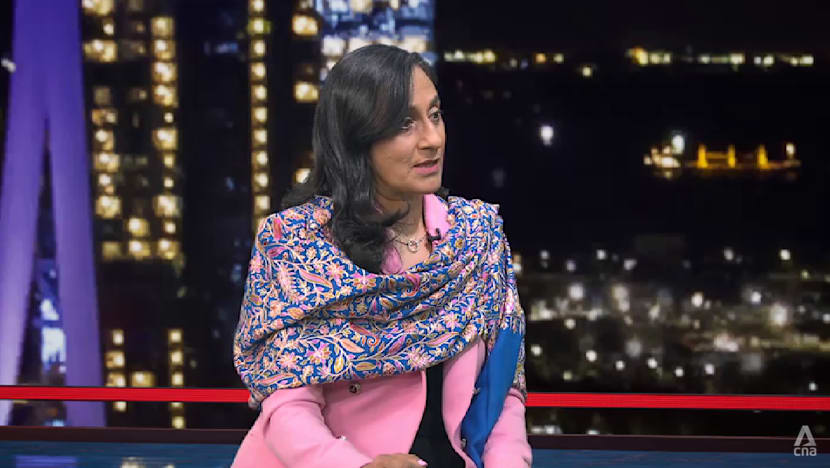Canada will cooperate with China where possible, challenge it where needed: Foreign Minister Anita Anand
Canada is approaching its engagement with China with its “eyes wide open”, while staying committed to open dialogue with a key Indo-Pacific partner, said Anand in an interview with CNA's Loke Wei Sue.

Canada is seeking to cooperate with China where possible and challenge it where necessary, while keeping dialogue open at all times, said Foreign Minister Anita Anand on Wednesday (Oct 15).

This audio is generated by an AI tool.
SINGAPORE: Canada is seeking to cooperate with China where possible and challenge it where necessary, while keeping dialogue open at all times, said Foreign Minister Anita Anand on Wednesday (Oct 15).
As part of a three-nation Asian tour from Sunday to next Friday, Anand will travel to China where she is scheduled to meet her counterpart Wang Yi.
“We are working to make sure we're cooperating with China where we can, challenging them where we must, but at all times, having a dialogue where we can raise issues of importance for Canada at the table of a very important partner in the Indo-Pacific,” she told CNA during the Singapore leg of her trip.
Both sides are expected to discuss their strategic partnership, the evolving global context and matters of economic significance.
Anand noted that Canada’s relationship with China is “complex” and spans a wide range of areas, adding that her meeting with Wang aims to keep dialogue open, address issues of concern and explore opportunities for cooperation.
“There are, indeed, issues in every bilateral relationship,” she said.
“We are eyes wide open and, indeed across the board, seek to have that ability for a dialogue with a very important partner (and) player in the Indo-Pacific.”
BUILDING RELATIONSHIPS
Anand’s trip - which covers India, Singapore and China - underscores Canada’s commitment to advance bilateral ties and deepen cooperation under its Indo-Pacific Strategy.
Anand emphasised that the country’s foreign policy is “grounded in pragmatism”, prioritising the building of relationships with a variety of nations, particularly in the Indo-Pacific region.
During her visit to Singapore, she sought to reaffirm and deepen ties with one of Canada’s key partners in Southeast Asia.
The trip also carried symbolic significance, as Canada and Singapore are marking 60 years of diplomatic relations this year.
Before arriving in Singapore, Anand made her first official visit to India, where she held talks with her counterpart S Jaishankar and Prime Minister Narendra Modi.
The meetings signalled a thaw in relations between New Delhi and Ottawa, which had been severely strained following the 2023 killing of Hardeep Singh Nijjar, a Canadian Sikh separatist leader.
Then-Prime Minister Justin Trudeau had accused India of involvement in the killing on Canadian soil – an allegation strongly denied by New Delhi.
The fallout led both sides to expel senior diplomats and restrict visa services.
India is Canada’s largest source of temporary foreign workers and international students, but a backlog of applications has since accumulated.
During discussions in New Delhi earlier this week, both sides agreed on a roadmap to repair bilateral ties and enhance collaboration in areas such as critical minerals, trade and agricultural value chains.
They also raised the importance of law enforcement dialogue to address security concerns.
Anand said that Canada’s engagement with India begins with “ensuring that public safety and security back at home are top of the agenda”.
“That's why the joint declaration that we finalised specifically mentions respect for the rule of law, respect for the security dialogue that we have with India on an ongoing basis,” she added.
“At another level, we are ensuring that step by step, we are elevating the relationship with India to include issues relating to trade resilience, issues relating to energy cooperation, issues relating to AI and new technologies, among others.”
PROMOTING MULTILATERALISM
In her address at the United Nations General Assembly last month, Anand touched on the importance of multilateralism in addressing global challenges such as climate change, and urged the strengthening of institutions like the UN.
“Canada is committed to cooperating and collaborating within multilateral organisations. That's not just words. That is the foreign policy of our country,” she told CNA, warning that the challenges ahead are ones no nation can face alone.
“I believe that countries can be most effective when they work together and they cooperate.”
The multilateral system is under strain as some nations turn toward protectionism and the global geopolitical landscape grows increasingly unstable, she noted.
“But Canada will be there as a leader, promoting multilateralism, looking for a way to improve these organisations across the board. We will not retreat.”
The minister added that Canada’s foreign policy now rests on three pillars: Defence and security, economic resilience, and core values in a rapidly changing world.
“This is a clear and concise foreign policy, and it will drive our work going forward internationally,” she said.
















